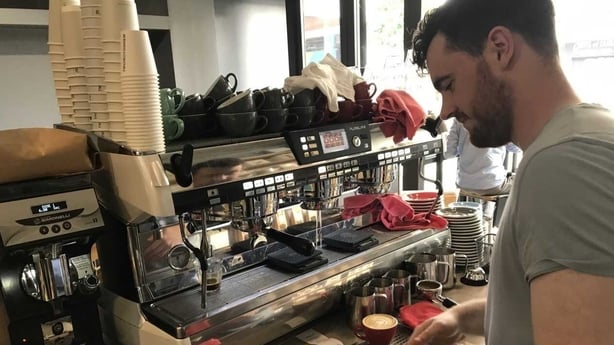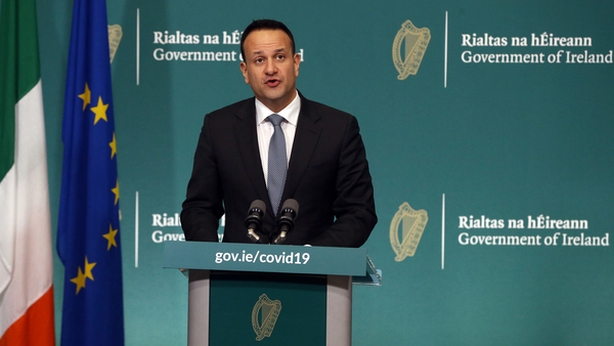At a time of social distancing, the Minister for Finance sought to reassure us that the "social contract" will remain intact.
The theory refers to the relationship between the State and individuals.
It's a relationship that is being redefined and re-written by a contagious virus that has upended the work of governments and the lives of the people they represent.
Liberties that were once taken for granted are being curbed. Measures that once appeared radical have almost instantly become mainstream. Policies that have been debated for years - like a single tier health system and a rent freeze - are implemented almost over night.
But Paschal Donohoe wanted to reassure the public that for all the changes that are under way, the underlying basis of that relationship remains intact.
"A central tenet of the social contract is the need for the State to respond at a time of crisis and great risk," said Mr Donohoe, speaking at a news conference outlining a range of measures his Government is taking in these unprecedented times.
The measures are far reaching and extraordinary and even at that some will feel that they are not enough. They will test the relationship between State and individual in a way that is still hard to predict.
In general, they fall into two categories: Social measures that experts have advised the Government are needed to protect the health of citizens and to mitigate the spread of the virus, and financial measures that the Government believes will help things return to normal afterwards.
The success of the first will dictate the success of the latter.
In the first category of measures, people are being asked to stay at home where possible.
Cafés and restaurants will be closed and shops selling "non-essential" items will be closed.

The measures will be less stringent than those introduced in other countries but still of the scale that no one could have imagined just a few short weeks ago.
Restaurants can serve take-aways, for example, because Taoiseach Leo Varadkar says, Irish people get 20% of their calories from take-out food.
While most high street shops will close, retailers selling household goods, hardware or electrical goods, as well as laundries, chemists and food shops will stay open. Builders will continue to work on sites and factories will stay open.
People will not be allowed to gather in groups larger than four people outdoors (unless they are from the same household) and there will be increase in gardai and park rangers at outdoor amenities to ensure physical distancing is being observed.
But the Taoiseach was eager to make the distinction between what he said can be done in a "liberal democracy" versus what he described as authoritarian and draconian actions.
"In Ireland since Independence, we always had policing by consent rather than by coercion and I don't intend for that to change that now. That is not our way," he said.
He was eager to point out that this was not a lockdown. But measures including the closure of schools, work places and childcare providers will last for some time yet.
"We are in this for the long haul and this could go on for weeks or even months," Mr Varadkar said.
The second set of measures are those which the Government says will help the economy to "bounce back when this is all over". It claims the best way of doing this is by maintaining the link between employers and employees.
These measures will involve a payment of €350 a week to the thousands who find themselves out of work – an increase on the €203 payment announced just two weeks ago.
The State will pay 70% of a worker's salary – up to a maximum of €410 a week – where the company agrees to continue paying the remainder of a salary.
Sticking to the social contract theme, the Taoiseach says the Government has chosen these measures not just to help protect the economy in the longer term, but because it is "the right thing to do and because we owe it to our fellow citizens".

The package announced today will cost almost €3.7 billion over the next 12 weeks, but the Government insists this is manageable for now because of the strength of the public finances and ability to borrow.
For how long that manageability lasts depends on the scale and duration of the Covid-19 crisis.
Minister Donohoe did not dismiss the prospect of an emergency budget: "That will depend on the duration of the crisis we are in," he said.
"We will be able to sustain the early part of our response. But the longer this challenge goes on the more likely it is that we will have to work within the Dáil to see how we can strengthen our ability to do it," he said.
Whether people accept his reassurances around the social contract remain to be seen. Such is the fast evolving nature of this crisis, there are many questions that have not yet been answered and many calls for further actions.
Some of the measures to ensure business owners are protected will be tainted by a looming clash between SMEs and insurers.
There are thousands of pubs and restaurants whose claims for loss of earnings are being rejected by insurance companies. Insurance providers argue their solvency could be called into question if they make payouts, but the hospitality sector – backed by Fianna Fáil – argues that insurers are relying on small print and technicalities to avoid payouts.
While those who lost their jobs might find some reassurance about the financial support from the State, Sinn Féin has claimed the sum on offer is "underwhelming".
Concerns remain about the costs of bills coming in the doors of those who are out of work. For example, tenants who have been laid off – many of them working in bars, restaurants or crèches – are calling for rent breaks from landlords for the duration of this crisis, however long it might last. The Government chose not to go as far as ensuring such a break.
Fianna Fáil’s Barry Cowen has questioned whether farmers will be entitled to pro-rata income support as a result of the closure of cattle marts and restaurants. And many opposition TDs are questioning whether keeping construction sites opened is sustainable given difficulties in adhering to physical distancing.
While the measures announced today are more far reaching than anyone could have imagined just a few short weeks ago, as the Government seeks to keep the social contract intact. Whether it is deemed to be enough, remains to be seen.






